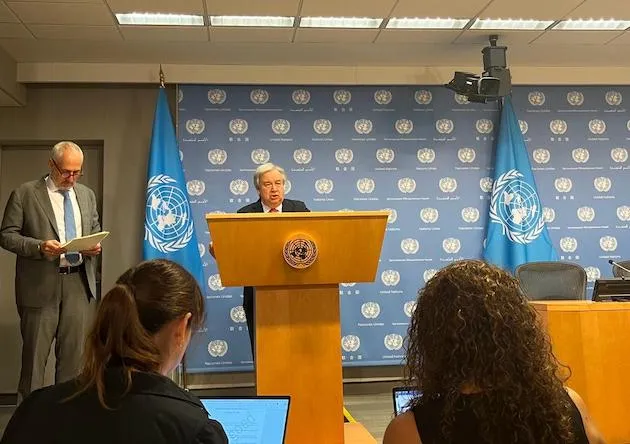As the world grapples with the devastating impact of climate change, the UN Secretary General, António Guterres, has issued a stark warning: “The era of global boiling has arrived.” The stark reality is that July is on track to be the world’s hottest month on record, shattering records that were previously thought to be unbreakable.
Guterres’s words are not hyperbole; the evidence is unequivocal. Scientists from around the world have confirmed that the past three weeks have been the hottest since records began, with July poised to surpass even the most optimistic predictions. The World Meteorological Organization (WMO) and the EU’s Copernicus Earth observation programme have both reported that global temperatures have shattered records, fueled by the burning of fossil fuels and exacerbated by violent weather patterns.
The consequences of inaction are stark. “Humanity is in the hot seat,” Guterres said, describing the unprecedented heatwaves that have affected vast parts of North America, Asia, Africa, and Europe. The UN chief urged politicians to take immediate action, warning that “the air is unbreathable, the heat is unbearable, and the level of fossil fuel profits and climate inaction is unacceptable.”
Despite the dire warnings, some progress has been made. A robust rollout of renewables and positive steps from sectors such as shipping are welcome developments, but they are not enough. The world needs accelerated action to limit global temperature rise to 1.5C above pre-industrial levels and avoid the worst of climate change.

The WMO Secretary General, Petteri Taalas, echoed Guterres’s sentiments, emphasizing that “the need to reduce greenhouse gas emissions is more urgent than ever before. Climate action is not a luxury but a must.” Climate scientists from around the world have confirmed the findings, with Zeke Hausfather, a climate scientist at the Berkeley Earth, predicting that July 2023 will be the warmest month on record by a large margin.
The impact of climate change is far-reaching, with deadlier heatwaves striking three continents this month. A rapid analysis from the World Weather Attribution network found that humanity made the heatwaves in southern Europe, North America, and China 2.5C, 2C, and 1C hotter respectively. The scientists emphasized that the extreme conditions are not rare and will become more frequent unless immediate action is taken to reduce greenhouse gas emissions.
In the face of this mounting evidence, world leaders are set to meet in the United Arab Emirates in November to agree on ways to stem global heating, adapt to more extreme weather, and pay for the damage. Sultan Al Jaber, the president of the COP28 summit, acknowledged that phasing down fossil fuels is “inevitable and essential” but urged governments to prioritize cooperation and provide finance at a scale that is currently not being provided.
As the world awakens to the reality of global boiling, it is imperative that governments, corporations, and individuals work together to transition away from fossil fuels and ensure a liveable future for generations to come. The clock is ticking, and the consequences of inaction will be catastrophic. As Marina Romanello, a climate and health researcher at University College London, urged, “We have data showing how the very foundations of health are being undermined by climate change, and despite that knowledge, we’re seeing governments and companies still prioritising fossil fuels. But we still have time today to turn the tide and to ensure a liveable future for us and our children.”

